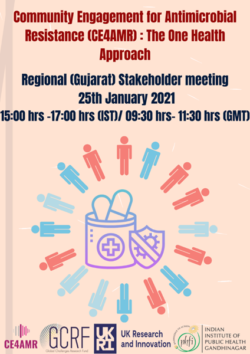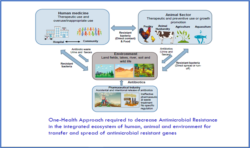National Stakeholder Workshops: India
In this week’s blog we reflect on our India National Stakeholder Workshops held as part of the CE4AMR: One Health Approach Challenge Cluster. Over the winter each of the six projects involved in the cluster held workshops or webinars to explore the National priorities on AMR and the scope to involve Community Engagement approaches in achieving these priorities. Two projects are based in India, at Jawaharlal Nehru University (JNU) and The Indian Institute of Public Health, Gandhinagar (IIPH). Due to COVID-19 restrictions both groups chose to run their workshops as online webinars with around 30 delegates per session.

Flyer for the IIPH workshop in January.
Both workshops identified antimicrobial misuse as a key driver of AMR. They also discussed the limited surveillance of AMR outside formal human healthcare settings and how this inhibited methods to control the spread of resistance and management of antimicrobial usage. Discussions in both workshops revealed that Indian stakeholders see Community Engagement approaches as a key method for engaging the public and specialist professionals (clinicians, vets etc.) with the challenge of AMR. Stakeholders recognized the ability of Community Engagement approaches to be tailored to the needs of specific audiences, giving flexibility in the AMR issues which could be tackled by CE.
The JNU workshop placed a specific focus on AMR within the Poultry production sector due to JNU’s collaboration with the One Health Poultry Hub, a GCRF/UKRI funded research hub to address the challenges of the growing demand for poultry across South East Asia. This workshop opened with plenary speakers but then allowed delegates to discuss their own AMR concerns within breakout rooms. The key learnings included the need to create mass AMR awareness in the public, with a specific focus on engaging school children with the problem. Farmers, vets, and agricultural drug sellers were identified as key stakeholders in tackling the challenge of antimicrobial misuse and should be engaged in the planning and design phase of Community Engagement projects. Animal husbandry in general was considered an important area to address in terms of minimizing AMR with suggestions for improvement including better veterinary antimicrobial guidance and better hand hygiene practices after handling animals.

The importance of holistic One Health action for addressing AMR in India. Image by Dr. Anita Kotwani
Finally, in terms of the poultry sector many stakeholders suggested the need to encourage the use of indigenous bird species (rather than standard broilers) as this could promote more natural variation in disease resistance in the sector. The take home message from this workshop was that multisector collaboration is needed to tackle the challenge of AMR through surveillance, awareness raising and education, and crucial changes in practice around antimicrobial use and animal husbandry.
The IIPH workshop focused on keynote presentations from speakers with a One Health view of AMR which included the agricultural sector. The desire for multisector collaboration on AMR was again a take home message with speakers stressing the need to join up our understandings of AMR can spread between human, animal, and environmental settings. Community engagement was viewed as central to initiating this joined-up approach by ensuring wider communities understand the One Health nature of AMR. Home and animal hygiene were again discussed as crucial drivers of AMR, as was antimicrobial misuse in human and animal health.
Both workshops placed emphasis on the need create holistic surveillance on AMR and communicate this to the wider communities beyond formal health care, agricultural and governmental settings. AMR needs to be recognized as everyone’s problem in order for meaningful changes in behavior and practice to take place.
